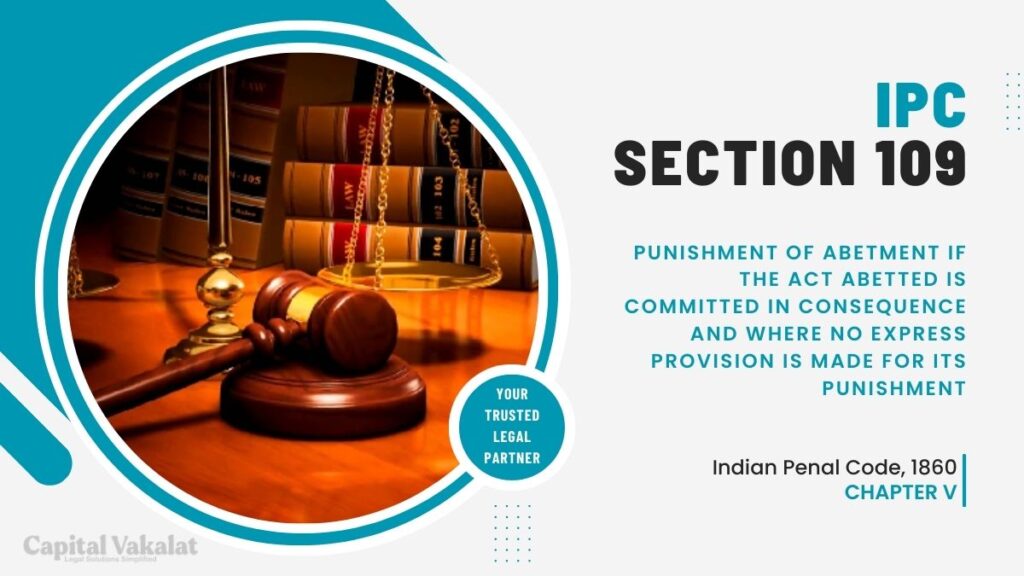In the vast realm of legal frameworks and penal codes, Section 109 of the Indian Penal Code (IPC) stands as a pivotal provision. It deals with the concept of abetment and the punishment for individuals involved in abetting crimes when the act they have abetted is committed as a consequence, even if there’s no specific provision for its punishment.

In this comprehensive article, we will delve into the intricacies of Section 109 IPC, exploring its meaning, interpretation, and implications in the legal landscape.
Understanding Abetment
What is Abetment?
Before we dive into Section 109 IPC, it’s essential to grasp the concept of abetment. Abetment is essentially the act of encouraging, instigating, or aiding someone in committing a crime. It involves actively supporting or assisting another person in committing an offense, either through direct actions or by providing inducements or encouragement.
Types of Abetment
Abetment can take various forms, including:
Instigating Abetment (Section 107 IPC)
This type of abetment involves actively persuading or provoking someone to commit a crime. It is covered under Section 107 IPC.
Conspiracy Abetment (Section 120A IPC)
Conspiracy abetment pertains to situations where two or more individuals conspire to commit an offense. It is elaborated under Section 120-A IPC.
Aiding Abetment (Section 109 IPC)
Aiding abetment, as per Section 109 IPC, focuses on individuals who assist in committing a crime. We will delve deeper into this in the subsequent sections.
Section 109 IPC: An In-depth Analysis
Section 109 of the IPC is a critical provision that deals with aiding abetment when the act abetted is committed as a result, and no explicit provision exists for its punishment. Let’s break down this provision further:
Elements of Section 109 IPC
Abetment
The primary element of this section is the abetment of a crime. It involves actively aiding, instigating, or encouraging another person to commit an offense.
Resultant Crime
Section 109 comes into play when the act abetted results in the commission of a crime, even if no specific provision exists for its punishment.
Legal Implications
Punishment
Individuals found guilty under Section 109 IPC can be punished in the same manner as if they had committed the offense themselves. This means that they face the same penalties as the principal offender.
Mens Rea
To establish guilt under this section, it must be proven that the accused had a guilty mind (mens rea) and intended to aid or abet the commission of the crime.
Significance in Legal Jurisprudence
Section 109 IPC plays a vital role in the Indian legal system as it ensures that those who aid or abet criminal acts do not escape punishment, even if the principal offender’s act is not explicitly punishable by law.
Conclusion
In conclusion, Section 109 IPC serves as a powerful tool to hold individuals accountable for aiding and abetting crimes when the act they have abetted results in a criminal consequence. It ensures that justice is served and that those who encourage unlawful actions are not exempt from punishment. Understanding this provision is essential for legal practitioners and individuals seeking to comprehend the nuances of Indian criminal law.
FAQs
What is the punishment for aiding abetment under Section 109 IPC?
Individuals aiding abetment under Section 109 IPC can face the same penalties as the principal offender of the crime.
Is mens rea essential for establishing guilt under Section 109 IPC?
Yes, mens rea, or a guilty mind, is a crucial element for establishing guilt under this section.
Are there any exceptions where Section 109 IPC may not apply?
Section 109 IPC applies unless there is an express provision in the law that explicitly excludes its application.
How can one protect themselves from being implicated under Section 109 IPC?
One can avoid liability under Section 109 IPC by refraining from aiding or abetting criminal activities and ensuring their actions are lawful and ethical.